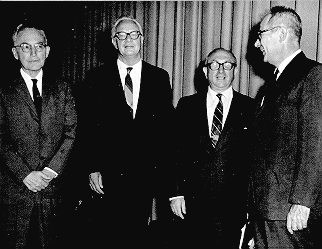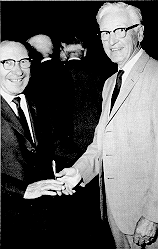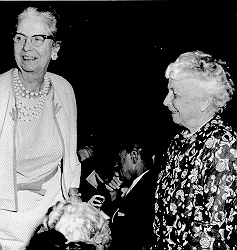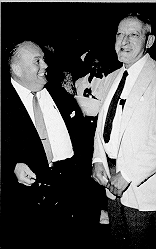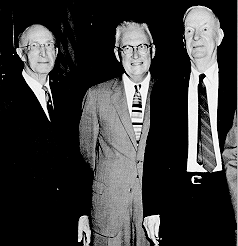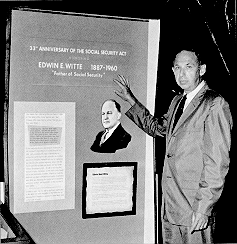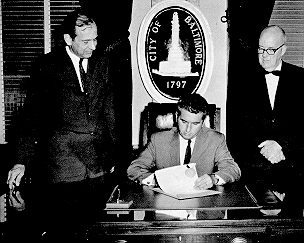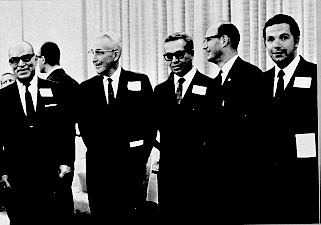33rd Anniversary - 1968
Happy Anniversary
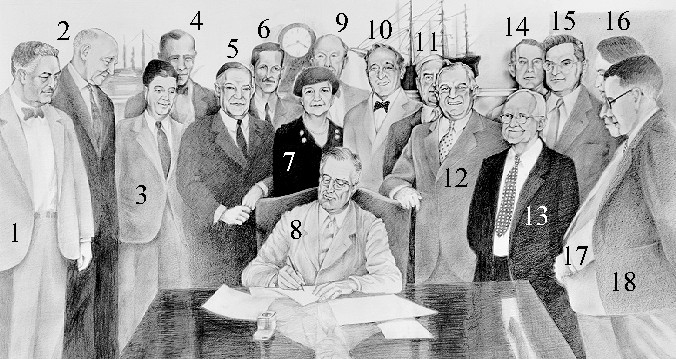
It was 33 years ago when President Roosevelt signed the Social Security Act.
(For identification of participants, click here.)
THE LOCALE WAS the DHEW auditorium. The day August 14, 1968. The occasion, the 33d anniversary of the signing of the original Social Security Act. The U.S. Marine Band played a rousing march; it should have been Auld Lang Syne. For this was the day that old friendships were renewed; the ORS-OA-OPEP-OI Committee had put the finishing touches on arrangements; Robert Robinson, Chief of Publications, ORS, had his last minute instructions from the Office of the Secretary. This was the day for people with long associations with social security to get together, and remember. On the stage were: Arthur Altmeyer, the first Commissioner for Social Security; Wilbur Cohen, Secretary of Health, Education, and Welfare; Willard Wirtz, Secretary of Labor; Robert Ball, Commissioner of Social Security; William Mitchell, former Social Security Commissioner; George Bigge, a member of the Social Security Board from 1936 to 1946; and Mary Switzer, Administrator of the Social and Rehabilitation Service, HEW. |
In the audience were the rest of the "family," the present Executive Staff, long-time employees who are still with us, and many who worked with the program during its formative years. Commissioner Ball said that the statisticians had estimated that the auditorium held 15,033 man-years of work in the cause of social security, and when he asked for everyone who worked with the program in 1937 or earlier to stand, you knew the statisticians must be correct--over half of the audience rose to its feet. Then came the individual introductions. It sounded like a listing from the "Who's Who in Social Security." There was Frank Bane, John Corson, I. S. Falk, Nelson Cruikshank, Beth and Karl de Schweinitz, Loula Dunn, Katherine Ellickson, Bill Haber, Maurice Mulliner, Fedele Fauri, Lavinia Engle, Leonard Lesser, Merton Bernstein, Victor Christgau, Joe Fay, Bert Seidman, Stanley Ruttenberg, Gladys Webburk, Bob Goodman, Roy Wynkoop, Oscar Pogge, Sarah Napier. Kay Johnson, Gladys Harrison, Olga Halsey, and many others.
Commissioner Ball provided an instant update to the audience, when he said that the 30 million original participants in the program had grown to over 90 million, and that every 33 seconds a new beneficiary was added to the beneficiary rolls, which now exceed 24 million. He said that the face value of the survivors part of social security is in the neighborhood of $950 billion. "Today we are keeping 10 million people out of poverty," he said. Attendees received preprints of the Social Security Bulletin, with more program information in comprehensive articles by Secretary Cohen, Commissioner Ball, and Assistant Commissioner, ORS, Merriam.
Flashing back to the beginnings provided a memorable contrast for the audience as they watched a rerun of the news film taken as President Roosevelt signed the Act. His voice, so familiar to the audience, rang through the auditorium, as he said, "This law represents a cornerstone in a structure which is being built, but is by no means complete, a structure intended to lessen the force of possible future depressions, to act as a protection to future administrations of the Government against the necessity of going deeply into debt to furnish relief to the needy, a law to flatten out the peaks and valleys of deflation and inflation--in other words, a law that will take care of human needs and at the same time provide for the United States an economic structure of vastly greater soundness." Labor Secretary Wirtz then showed the close relationship his department has had with HEW through the years in sharing the same national problems of economic security. Declaring a close interest in our program, Secretary Wirtz said that the perennial "job when you can work, and a benefit when you can't" has been a good motto, especially for his involvement in an unemployment program. He cited the 137 million who have received $44.5 billion in unemployment compensation since 1936.
Quoting from Arthur Altmeyer, as he looked into the future of social security, Mr. Wirtz also saw it "always as a goal, never a finished thing, because human aspirations are infinitely expandable--just as human nature is infinitely perfectible." Mr. Wirtz remarked that each generation uses with wisdom the tools available . . . There is no attainment . . . we are always building. Mr. Wirtz looked into the coming years, saying that in this age of affluence people will want more than equal opportunity . . . more than security. "Life is not just being, or being secure," he said. "It is living, and growing!" Mr. Ball returned to the rostrum and introduced Dr. Morones-Prieto, Director General, Mexican Institute of Social Security and President, Inter-American Committee on Social Security, who with two members of his staff had come to the ceremonies to honor Mr. Altmeyer and those who have followed him in building the social security program of the United States. He also introduced Mrs. Altmeyer, Mrs. Mitchell, and Mrs. Ball.
The band struck up "On Wisconsin," the TV cameras started to roll, and the Secretary received a standing ovation from the throng. Secretary Cohen, hailing his friends of many years who were in the audience, addressed them (and the headquarters employees in Baltimore, who listened to the ceremony in their auditorium) on "Social Security Looks Ahead." After giving a detailed description of the early days in the agency, and citing many of Mr. Altmeyer's contributions, he said: "I know that the people in this room are not content with self-congratulations. Now is the time for looking ahead, for measuring the distance yet to go. We know that the job is not yet done. We know there are grave weaknesses that must be corrected. We know that social security and the related programs must continue to grow and change with the times. "In the next decade, social security institutions can and must play a more important role in the elimination of poverty .... Health insurance must be broadened and expanded through a combination of public and private efforts. Our unemployment insurance system needs strengthening, and our welfare programs must be radically reshaped to meet new needs. We need more comprehensive community social services, and coupled with these efforts we need jobs, training, and education for more of our people. "But in the spirit of those who created the basic law and in the light of social security's proven ability to grow and develop with the times, we can face the complex challenges of today and tomorrow with confidence. I am sure that the gaps and inadequacies we now see will be remedied as our productive capacity continues to grow. "We must seek and maintain a social security status commensurate with our growing national income and potential--a status worthy of this Nation's expectations for all of its people. We must continue to move toward a life of dignity and independence and greater meaning for all Americans . . ." concluded Mr. Cohen. Following this he turned to Mr. Altmeyer and presented to him and to Mr. Mitchell medal citations "for distinguished services" from the International Social Security Association (ISSA). Next came the highlight of the program, the presentation of an HEW Award for Distinguished Public Service, to Arthur Altmeyer, "in recognition of his singularly creative and courageous contributions in shaping the programs of the Social Security Act during the formative years." Quoting from the citation: "More than any other single individual, Arthur Altmeyer is responsible for the social security system which today serves the American people. Beginning in 1934 he chaired the Technical Board appointed by the President's Committee on Economic Security. Later as a member and chairman of the Social Security Board, and as Commissioner for Social Security, he continued to display great sensitivity to human needs plus outstanding capability to meet those needs.... Under his leadership the programs established under the Social Security Act were guided and shaped through their first 18 years of trial and development. Imagination and resourcefulness marked him as an administrator in that crucial era. He helped to build a strong foundation capable of supporting the extension of social insurance protections to additional millions. The unprecedented experiment in Federal-State cooperation required by unemployment insurance and public assistance was able to go into operation in large part because of farsighted policies he was influential in establishing. By the time he returned to private life, Arthur Altmeyer's firm convictions and extraordinary abilities had helped to mold social security's institutions into the very fabric of American life." Before he called on Mr. Altmeyer to speak, Secretary Cohen announced that he had created a new award, the Arthur J. Altmeyer Award for outstanding contributions to economic security. He then presented the first Arthur J. Altmeyer Award to Robert Ball for "His leadership, dedication, and administrative ability have brought hope and dignity to millions of Americans." Commissioner Ball said the secret had been well kept and acknowledged his pleasure and his surprise. It was then time for Mr. Altmeyer's address. Protesting that he was brought to the ceremony under false pretenses, Mr. Altmeyer graciously accepted his award, saying he merely personified what all the people gathered in the auditorium had done. He gave credit to Senator Pat Harrison of Mississippi (Chairman of the Senate Committee on Finance in 1935) for seeing the long-range benefits of a social insurance program. He reminisced about the original small organization, where everyone knew each other, and mused on whether we hadn't lost that human touch in today's bigness. He hastened to reassure all that maybe we hadn't, because of the personal warmth and concern that the employees display as they serve the public. The Marine Band played a recessional, and the auditorium was suddenly empty. In that void, one couldn't help but wonder--and be proud of--those founding fathers--their commonsense--their sensitivity--their wisdom--in knowing what was good for the people the program was to serve . . . and for the organization charged with its administration.
|
